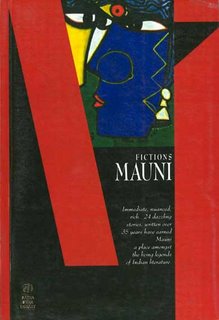
"... the only one who can stand at the extreme frontiers of the imgination and captre those concepts which have so far refused to be contained in words," says the writer who revolutionized the Tamil literary scene, Pudumaipittan.
"Mauni," says Lakshmi Holmstrom, "came into prominence in the 1930s, and along with Pudumaipittan, is considered one of the great modern short-story writers in Tamil. He is a writer's writer, an innovator and self conscious stylist ... and he wrote only twenty-four stories, in all. Mauni's stories, unlike Pudumaipittan's are concerned with the inner world of imagination rather than the external world of social change..."
The Statesman
(October 31, 1997 )
Manoj Das
Synopsis
Mauni known for his innovative use of the narrative form, explored new horizons in the Tamil short story genre. This volume, the third in the Katha Classics series presents eleven stylistically refreshing stories. Bordering strongly on the metaphysical, these stories structured around minimalist plots, confer a sense of the bizarre on situations that are otherwise commonplace. Encompassing a wide range of emotions and experiences, Mauni’s mindscape finds expression in the irregular rhythm of life itself. This makes for a compulsive read.
Reviews and Commentary
… with Mauni (S Mani, 1907-1985) the short story in Tamil found a new freedom and assurance. When P Raja, then a student and now a noted scholar, met Mauni in the seventies and asked him if he would give a clue to appreciating his works, he brushed aside the demand, saying, “I write for the 21st century.”
It is significant that a collection of his stories has been made available in English soon before the dawn of the new century on which the celebrated writer pinned his hope ...
The translation is excellent and Venkat Swaminathan’s article, “Mauni and the Tamil Short Story,” is a valuable document.
The Book Review
(January - February 1998)
Vijaya Ramaswamy
Mauni’s short stories are one of the most serious collections to hit the Indian literary scene in recent years. The credit for this goes to the Katha team and the dynamism of Geeta Dharmarajan. This reviewer felt that the best tribute one could pay such an important publication was a detailed study of the translations compared at every point by reference to the original text. Looking minutely at the translation of each story one must congratulate Lakshmi Holmstrom on her brilliant translations …
The translations are faithful to both the letter and the spirit of the original text …
Mauni: A Writers’ Writers on the whole makes for a compulsive read, shades of pastiche notwithstanding.
Indian Review of Books
(September 16 - November 15, 1997)
It is not usual for a review to come dripping with gratitude. This time, though, that is precisely how it must. For Mauni: A Writers’ Writer is the most tastefully produced, the most sensitively edited and translated, the most imaginatively formatted Indian book that I have ever come across. Everything is simply dazzling about this “collaboration” of love ... the series editor Geeta Dharmarajan’s resolve to “resurrect” him before the world; the sensitivity and hard work evident everywhere in Holmstrom’s introduction and translations … it is priceless …
Reading the eleven stories is, to invoke Murphy again, “such pleasure that pleasure (is) not the word.” Organized along a matrix of surds, the stories have little characterization and less plot about them. They are, in a sense, about the apparatus called Mauni’s mind which, like Murphy’s, is a sensationally self-opposed, self-opposing thing ...
The texture has a sensuous beauty that reminds one of the best of Shakespeare. The details which it is made up of are apparently inessential, but, even when they are not symbolic, they generate the overall emotional mood in which, for example, the stone yaalis in a temple can shake and fume with rage as a non-preordained love story is about to be born ...
For anyone interested in testing their ability to pluck out the heart of mysteries, the volume has a number of teasing tales ...
Mauni here, as everywhere else, is wholly successful in negotiating with western romanticism and modernism on the most honourable Indian terms.
Publishers: Katha
Library: Katha Classics/Tamil
Price: Rs 200


0 Comments:
Post a Comment
<< Home